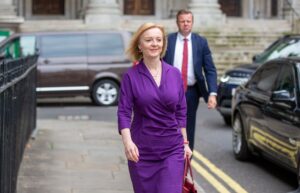
Liz Truss will warn today of more disruption ahead as the price of economic growth, after another day of cabinet infighting threatened to derail her first party conference as leader.
The prime minister will try to unite her party against what she claims is an “anti-growth coalition” of Labour, the unions and vested interests holding Britain back. These groups “prefer protesting to doing”, she is due to say, and take taxis from north London townhouses to BBC studios “to dismiss anyone challenging the status quo”.
Her speech, on the final day of the Conservative Party conference, is in danger of being overshadowed by a cabinet revolt over plans to stop benefit rises, as well as lingering acrimony over Monday’s U-turn on scrapping the top rate of tax. At least five ministers have raised concerns about the fairness of Truss’s plan to cut benefits in real terms when people are struggling with the cost of living.
Truss will use her speech to highlight the “immense” scale of the challenges facing Britain, including Russia’s invasion of Ukraine, the effects of Covid-19 and a global economic crisis.
She is due to argue that economic pressures mean Britain must “do things differently”, even if that means difficult decisions in government.
“Whenever there is change, there is disruption,” she will say. “Not everyone will be in favour. But everyone will benefit from the result — a growing economy and a better future.”
The prime minister is also expected to appeal for unity, saying: “I will not allow the anti-growth coalition to hold us back. Labour, Lib Dems and SNP, the militant unions, the vested interests dressed up as think tanks, the talking heads, the Brexit deniers and Extinction Rebellion.
“From broadcast to podcast, they peddle the same old answers . . . more taxes, more regulation and more meddling. Wrong, wrong, wrong. We see the anti-growth coalition holding us back.”
After two U-turns in 24 hours — on the 45p tax rate and when a fiscal statement will be published — sniping between cabinet ministers erupted into plain sight yesterday. Penny Mordaunt, the leader of the Commons, was the subject of caustic briefings by colleagues after she suggested benefits should rise in line with inflation, rather than with wages. One accused her of “freelancing” and playing to the One Nation group of centrist Tory MPs.
However, Chloe Smith, the work and pensions secretary, and Sir Robert Buckland, the Wales secretary, have publicly expressed similar concerns. Two more ministers said privately that they were also opposed to benefits being curbed.
Truss has argued that it would be unfair for workers not on benefits to get pay rises of about 5 per cent as benefit payments rose by 10 per cent.
Suella Braverman, the home secretary, appeared to take Truss’s side, arguing that “Benefit Street culture is a feature of modern Britain” and warning of “a stubborn core who see welfare as the go-to option”.
Braverman also reopened the row over the top rate of tax, saying she was disappointed by the U-turn and accusing the government’s Tory opponents of having “staged a coup”.
Her views were endorsed by Simon Clarke, the levelling-up secretary, but Kemi Badenoch, the international trade secretary, said: “I don’t think we should be talking about coups. People should be able to change their mind without the world coming to an end.”
Some of Truss’s most vocal supporters are increasingly open about their frustrations. Lord Frost, the former Brexit minister, said benefits should rise in line with inflation, and criticised the government’s “avoidable mistakes”, adding: “They are going about it in quite an amateurish and bungling way.”
Nadine Dorries, the former culture secretary who was one of Truss’s most important backers early in the leadership election, attacked her for the second time in two days, warning that she had “no mandate” to change Boris Johnson’s policies. “If we don’t want to deliver on the deal, the promises, we need a fresh mandate,” Dorries said.
Grant Shapps, the former transport secretary, said Tory MPs would not “sit on their hands” if Truss kept trailing Labour in the polls, telling Times Radio: “A way would be found.”
There was confusion yesterday over when Kwasi Kwarteng, the chancellor, will publish his fiscal plans. It was reported on Monday that they would be brought forward from November 23 in an effort to calm the market, but on GB News yesterday he said: “People have been reading the runes and the pauses — it’s going to be the 23rd”.
Sources said the publication was still likely to be this month, but that Kwarteng wanted to announce the accelerated timetable formally to parliament.
Read more:
Truss set to warn of more disruption ahead in first speech as Tory leader






